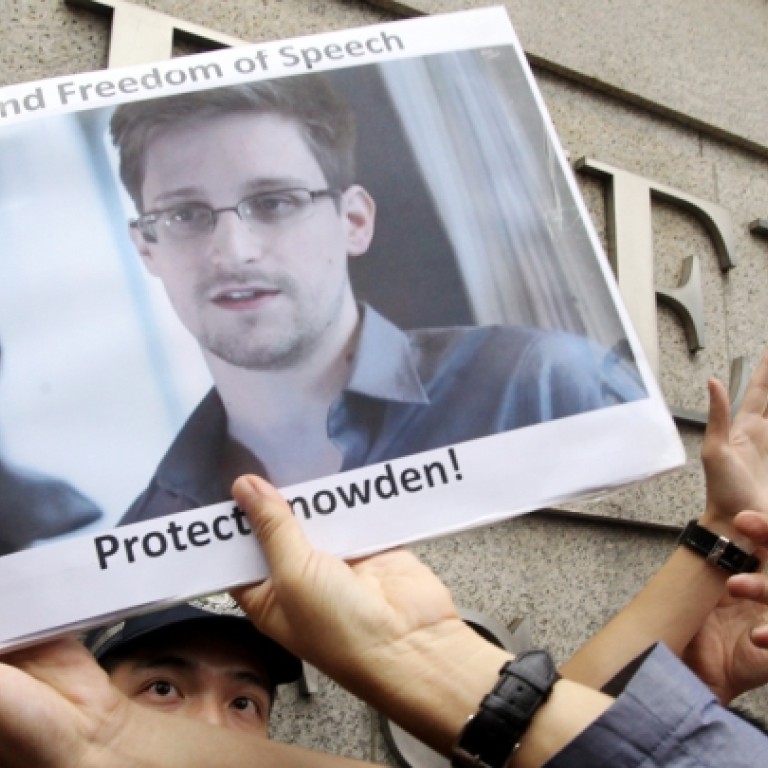
Hong Kong's political foes made allies amid Edward Snowden storm
While CY's team remained relatively tight-lipped on Edward Snowden, whistle-blower brought the pan-democrats and Beijing loyalists together
While Chief Executive Leung Chun-ying tried desperately to keep his views on the Edward Snowden case to himself, it seemed everyone else in Hong Kong had something to say.

Although he never appeared in public, the 30-year-old former CIA technician and National Security Agency contractor immediately became a household name after revealed his name and the fact he had fled to the city on May 20.
All eyes were on how Leung's administration, with its limited diplomatic experience, would handle the tricky situation and whether Beijing would intervene. Snowden's revelation to the that the NSA had targets in Hong Kong and on the mainland stirred further debate.
"My intention is to ask the courts and people of Hong Kong to decide my fate. I have been given no reason to doubt your system," he said, a dictum he abandoned as he slipped out of the city yesterday morning.
"He [Snowden] made full use of Hong Kong to spill his secrets during his month-long stay. There are a lot of media here. There are many consulates. He plays his cards very well," said Regina Ip Lau Suk-yee, the New People's Party lawmaker and former security chief who has faced scores of questions on Snowden.
Ip was among the first public figures to call on Snowden to leave the city in view of the extradition treaty with the US, an opinion that earned her much criticism at the time.
Other Hongkongers took the debate to the streets, through a high-profile protest march last Saturday and in the form of eye-catching "Save Snowden, Save Freedom" posters in Central, near the US consulate.
Those who made their views known to the US included not just the seasoned protesters of the pan-democratic camp, but also government-friendly politicians including Executive Council member Starry Lee Wai-king, a lawmaker from the Democratic Alliance for the Betterment and Progress of Hong Kong (DAB).
Not much unites Lee and radical veteran "Long Hair" Leung Kwok-hung, but on this occasion they found themselves on the same side - even if the DAB chose to make its own, separate march to the consulate.
Initially, while the democratically minded wanted Hong Kong to respect Snowden's human rights and not allow extradition, Beijing-loyalists focused their criticism on the US government for spying on local computers.
But the two sides joined in backing a call by the Democratic Party to invite Snowden to break cover and testify before the Legislative Council on the details surrounding his exposé to the .
A Democratic Party source said the move was intended to counter accusations from Beijing-loyalists that the party might skirt around criticism of the US due to the American connections of Martin Lee Chu-ming, founding chairman of the party.
Mainland newspapers, initially coy on the Snowden story, also began to join the debate.
On Monday, the party-run said in its editorial the city's image as a bastion of freedom would be tarnished if its government allowed Snowden's extradition. Two days later another editorial called on the Hong Kong government to "interact directly" with public opinion.
But Leung and his team were largely silent on the issue - at least until its explosive press release yesterday calling on the US to explain itself over Snowden's accusations of hacking. The release was issued while Snowden was well into his flight to Moscow.
One moment that summed up the government's attitude to the case came when Leung refused seven times to "comment on any particular case" when questioned by Bloomberg TV. The interview and Snowden affair largely overshadowed Leung's visit to New York.
Political speculation suggested that Leung's silence reflected a wait-and-see approach on the thorny issue and the possibility of Beijing exercising its right to intervene in the extradition.
Scholars agree Snowden's decision to flee via Moscow probably made sense. Simon Shen Xuhui, a professor of international relations at Chinese University, said he believed the local and US governments would accept the latest development.
Professor Simon Young Ngai-man, director of the centre for comparative and public law at the University of Hong Kong, said: "Snowden has been an interesting passing snowstorm … The world has learned a bit more about [our] legal system and geopolitical circumstances. We have all learned a lot about the man who has changed the world."
Leung earlier came out with two brief public comments on the case but, questioned by TVB yesterday, he said: "I could not answer, sorry."

